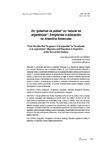Do gobernar es poblar ao educar es argentinizar: emigrantes e educación na Arxentina finisecular

Ver/Abrir
Use este enlace para citar
http://hdl.handle.net/2183/16826Colecciones
Metadatos
Mostrar el registro completo del ítemTítulo
Do gobernar es poblar ao educar es argentinizar: emigrantes e educación na Arxentina finisecularTítulo(s) alternativo(s)
From the Idea That 'to Govern Is to Populate' to 'to Educate Is to Argentinize': Migrants and Education in Argentina at the Turn of the CenturyAutor(es)
Fecha
2013Cita bibliográfica
Malheiro Gutiérrez, X. M. (2014). Do “gobernar es poblar” ao “educar es argentinizar”: Emigrantes e educación na Arxentina finisecular. Sarmiento. Revista Galego-Portuguesa De Historia Da Educación, 17, 161-184. https://doi.org/10.17979/srgphe.2013.17.0.4094
Resumen
[Resumo] A poboación que forma a Arxentina finisecular é un aluvión de culturas, linguas e influencias ideolóxicas que a estrutura política do novo Estado pretende uniformar e consolidar baixo un sentimento identitario que necesariamente debe comezar por formarse na escola. O presente traballo detense na tendencia dos diferentes colectivos inmigrantes para manter e preservar as súas señas de identidade no lugar de destino mediante experiencias educativas propias e nas estratexias do propio Estado por crear instrumentos lexislativos que axuden a construír un sentimiento de pertenza, inherente á formación dun nuevo cidadán no novo tempo político poscolonial. En ambas vertentes dunha mesma realidade, a escola desempeña un papel fundamental [Abstract] The population that formed Argentina at the turn of the century was a barrage of cultures, languages and ideological influences which the political structure of the new State aimed to standardize and consolidate under a sense of identity, which was inevitably and necessarily developed in the schools. This article takes a close look at the trends of the different immigrant groups to preserve their characteristics and identities in their countries of destination by means of both their own educational experiences and State strategies to create legislation geared towards building a sense of belonging, fundamental to the education of new citizens in the new post-colonial political era. From both sides of the same situation, schools played a key role
Palabras clave
Emigración
Inmigración
Educación
Ideoloxía
Lexislación educativa
Historia da educación arxentina
Escola
Asociacionismo emigrante
Emigration
Immigration
Education
Ideology
Education legislation
History of education in Argentina
School
Migrant associations
Inmigración
Educación
Ideoloxía
Lexislación educativa
Historia da educación arxentina
Escola
Asociacionismo emigrante
Emigration
Immigration
Education
Ideology
Education legislation
History of education in Argentina
School
Migrant associations
Versión del editor
ISSN
1138-5863





